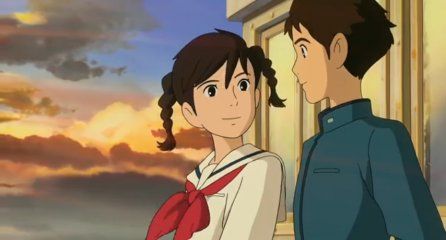Destroy the old and you destroy our memory of the past.

While I'm waiting for Hayao Miyazaki's The Wind Rises to get a wide release, I caught up with Studio Ghilbi's prior feature, From Up on Poppy Hill, which came out in Japan in 2011, but didn't make it to the States until last year. Directed by Miyazaki's son Goro and written by Miyazaki and Keiko Niwa, his script collaborator on The Secret World of Arrietty, From Up on Poppy Hill is set in a small harbor town in the lead-up to the 1964 Tokyo Olympics, which has inspired countrywide beautification efforts. At Konan Academy, that has translated to a plan to tear down the students' dilapidated clubhouse and build a new one in its place, which the student body is vehemently opposed to. That's the backdrop for a story of discovery and budding first love which is handled with great sensitivity, as one would expect from Ghibli.
In this instance, the central character is Umi, a schoolgirl who has taken on a number of weighty responsibilities in the absence of her father, a boat captain who died during the Korean War, and her mother, an academic who's spending time abroad. Whether she's aware of it or not, Umi is paired up with Shun, the "live wire" editor of the school paper who's not above pulling dangerous stunts to draw attention to their efforts to save the clubhouse. Things don't really begin to look up, though, until Umi takes an interest, spurred on by her younger sister's desire to get Shun's autograph. That sets the stage for the uncovering of a long-buried secret that has the potential to change both their lives.
If Poppy Hill's story is on the slight side, that's entirely by design. What stays with the viewer is Umi's good heart and the attention that is paid to even the most mundane household chores. The part of her daily routine that gains the most resonance over the course of the film, though, is her raising and lowering of maritime signal flags. How this one, simple acts gets interpreted depends entirely on who's perceiving it.